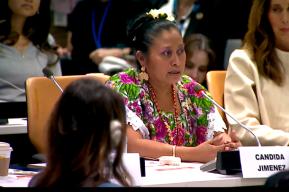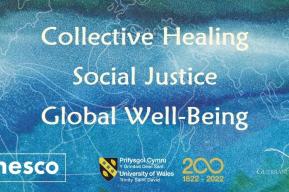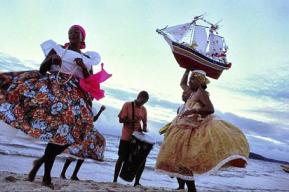
Routes of Enslaved Peoples
Since its launch in 1994, the UNESCO "Routes of Enslaved Peoples: Resistance, Liberty and Heritage" Programme has contributed to the production of innovative knowledge, the development of high-level scientific networks and the support of memory initiatives on the theme of slavery, its abolition and the resistance it generated.
At the international level, the programme has thus played a major role in "breaking" the silence surrounding the history of slavery and placing this tragedy that has shaped the modern world in the universal memory.

Goals
Today, among its major objectives, the programme contributes to "de-racialising" our vision and "decolonising" our imaginations of the world by
- deconstructing the discourses based on the concept of race that justified these systems of exploitation,
- promoting the contributions of people of African descent to the general progress of humanity, and
- questioning the social, cultural and economic inequalities inherited from this tragedy.

Preliminary calendar of confirmed activities
for the 30th Anniversary in collaboration with Member States and external partners.
The calendar will be regularly updated.
Archives
As part of its 30th anniversary, the Routes of Enslaved Peoples Programme will be making its archives available online throughout the year. Consisting of scientific articles, project concept notes and letters, these archives are an invaluable resource for comprehending the development of this flagship programme, recognized as an innovative change-maker by international experts and impacted communities.
International Scientific Committee
The International Scientific Committee of the Programme consists of 20 members appointed by the Director-General of UNESCO.
The Committee members, who represent different regions, areas of expertise and gender, hold a mandate of four years.
The main function of the Committee is to advise UNESCO on the implementation of the Programme.

UNESCO Network of ‘Places of History and Memory linked to Enslavement and the Slave Trade'
National Commissions for UNESCO can submit, on behalf of their government, the following form for a Place of History and Memory linked to Enslavement and the Slave Trade to be part of the dedicated Network.
If the admission to the Network is accepted (for a period of five years and renewable under certain conditions), managers of the place will be able to share good practices and shape common activities with other places managers, while benefiting from UNESCO’s support in the form of technical assistance, joint advocacy, and outreach.
Through this international Network, UNESCO aims to preserve such places through local populations' trainings for their socio-economic benefits, and foster intercultural dialogue, especially among members of the African Diaspora.
For additional information, please contact SHSREP@unesco.org.
News
Healing the psychological consequences of slavery
In recent years, groundbreaking research in psychology, cognitive psychology and epigenetics has highlighted that traumatic stress can not only alter behaviour, cognition and psychological functioning, but its effects can also be passed on to subsequent generations. In this sense, a traumatic event that we have not directly experienced can still have psychological and social impacts on our lives. Communities carry the history of disastrous events and their consequences in the content of their DNA but also in their representation of life in general and the way they commemorate history.
For the UNESCO "Routes of Enslaved Peoples" Programme, the challenge is to extend this approach, recognize the impacts of postcolonial cognitive dissonance and develop a 'healing map' to better understand how to heal impacted individuals and communities intergenerationally and, in so doing, address structures of socioeconomic inequality based on historical harm. This work on anti-racism is articulated around our initiatives on the gender biases and stereotypes embedded in our cultures, laws and institutions that prevent the empowerment of women and girls, particularly those of Indigenous and African descent, and the full enjoyment of their human rights.
- Read the full report
- See also: Launch of the Report on "Healing the Wounds of Trans-Atlantic Slave Trade and Slavery"

Slavery, Racism and Discrimination
How can we understand the major contemporary challenges of the fight against racism and all forms of discrimination without knowing the history and processes that have shaped and legitimized such practices? In order to effectively combat the inequalities suffered by the descendants of enslaved people and Afro-descendants in general, the study of the history of slavery is fundamental, particularly for young audiences. Through the staging of shows and collaboration on books and films, the "Routes of Enslaved Peoples" Programme works to promote and recognize the history of black people with a view to consolidating the values of tolerance and respect in the minds of young people.
International Decade for People of African Descent
There are approximately 200 million people of African descent living in the Americas and several million more in the Indian Ocean, Europe, the Arab world, etc. Whether as descendants of victims of the transatlantic slave trade and slavery or as migrants facing racism, they are much more exposed to social exclusion and inequalities, particularly in terms of access to education, employment, health and justice. This worrying issue is at the heart of the United Nations agenda.

Cultural resistance and contemporary creativity
Enslaved people have always resisted, whether by weapon or by thought, that is, through cultural resistance. The enslaved, although far from their native lands, took with them their memory, whether musical, spiritual or of any other kind.
The best known form of this cultural resistance is undoubtedly jazz, the direct heir to the songs called "negro spirituals", in which the pronunciation, rhythm and certain instruments used are reminiscent of African rites. Candomblé, capoeira, and even tango for some are legacies of these enslaved peoples.
These resistances developed wherever the enslaved lived, as in southern Morocco, where the Gnawas are the musical pride of the country. UNESCO is working to preserve and enhance this heritage through publications, debates and other public meetings so that its memory can contribute to the recognition of the cultural contributions of people of African descent.
Furthermore, in keeping with UNESCO's commitment to supporting artists, the "Routes of Enslaved Peoples" Programme seeks to develop and accompany contemporary creations on the themes of slavery, the slave trade and its contemporary consequences.

The story of slavery tells us that we can overcome. That the world can change for the better. And that we can do more than simply survive – we can soar!
Marcus Miller, Spokesperson
Marcus Miller, a renowned American jazz musician, composer and producer, was nominated UNESCO Artist for Peace and Spokesperson for the "Routes of Enslaved Peoples" Programme, by UNESCO's Director-General, on 4 July 2013.
Mr. Miller raises awareness about a phenomenon that has had a profound impact on the modern world, from religion and culture to the human rights movement. As an Artist for Peace, he promotes the lessons learnt from the tragedy of slavery and the slave trade, and how they can be used to address many of today’s major issues: national reconciliation, respect for cultural pluralism and the need to construct inclusive and just societies.
Read more
- Marcus Miller: singing freedom
- Marcus Miller celebrates Emancipation at the United Nations
- Jazzman Marcus Miller named UNESCO Artist for Peace
- Marcus Miller: acceptance speech UNESCO Artist for Peace Title


Publications

Educational materials on the influence of Afro-descended in Central America
The UNESCO Office in San José (Costa Rica) has developed the Collection "Del Olvido a la memoria" (From oblivion to memory), educational materials on the influence of Afro-descended in Central America.
Produced in collaboration with the University of Costa Rica (UCR) and the National Museum of the country, this collection includes a five volumes series of teaching materials that are part of an initiative of Central America countries to eliminate the ignorance about the influence of populations of African descent in the region.
Funded by UNESCO, this series of publications is part of the "Routes of Enslaved Peoples" Programme and accompanies its new orientations with regard to geographical expansion to regions insufficiently covered on this topic and introduction of new themes.
Besides the dissemination of these materials, UNESCO is working actively towards their inclusion into curricula of Central America countries and organizes workshops to:
- Validate the content of brochures prepared by UNESCO on the African presence in Central America
- Provide teachers with suggestions and recommendations for working with students, promoting learning about African heritage in each country
- Obtain recommendations to implement the study of history, the presence and contribution of Africans in Central America in the educational programs of Ministries of Education respectively
As of 2018, "Building Our Nation: The Contribution of Afro-Caribbean Migration in Costa Rica" is available online. This is a miniseries of documentaries that can be used as an educational tool, produced by the Chair of African and Caribbean Studies and the Vice-Rectory of Teaching of the University of Costa Rica, with the support of UNESCO. The four documentaries provide a first-hand account, through testimonies, of the experience of migrants from the Caribbean islands in the process of integrating their descendants into the country.
















